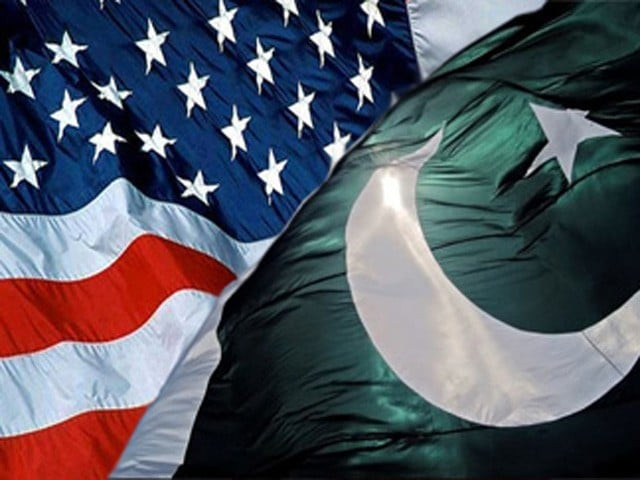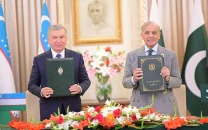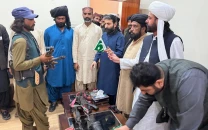Islamabad seeks mutually beneficial relationship with Washington
Top envoy says ties can no longer be viewed from the prism of another nation or transaction

Pakistan’s top envoy in Washington seeks a mutually beneficial relationship with the United States, which is not viewed through the transactional foreign policy lens.
Speaking about the future of US-Pakistan ties at an event hosted by the Atlantic Council, a Washington-based think tank, Ambassador Asad Majeed Khan said both countries need a stand-alone relationship.
“The US-Pakistan ties should not be seen through the prism of any other country and should not be seen through the prism of any other transaction,” said Ambassador Khan.
“Now is the time to have a relationship for each other – a relationship that is not against anyone, but for the people of our two countries,” the diplomat explained.
Quoting Richard Armitage, a former US diplomat, Ambassador Khan said, Washington and Islamabad have always had a relationship that is directed against something.
“At one point in time, we were allies against communism, at another point in time, we were allies against the Soviet invasion of Afghanistan, and then, at another point in time, we were fighting terrorism,” Ambassador Khan reminded the audience. The US-Pakistan ties, the diplomat said, have always been seen in transactional terms.
The US and Pakistan have a long and complex relationship which is defined by the nature of Washington’s business in the region. In the decades after the Soviet invasion, Afghanistan became a defining feature in the ties between the two countries.
Shortly after the Soviet army left Afghanistan, Islamabad felt abandoned. Once again, after the September 11, 2001 attacks, Pakistan’s services were obtained during the US invasion of Afghanistan.
The perception and narrative on Pakistan have undergone a change. And it is not by default, Pakistan has earned this shift and change
Ambassador Asad Majeed Khan
The relationship temporarily cooled during President Obama’s term, but shortly after President Trump decided to pull America out of its longest war, Pakistan was once again needed.
Talking about the future of Washington-Islamabad ties, Ambassador Khan said it was important to acknowledge that Pakistan has transformed. “Pakistan wishes to harness its geographic potential and is ready to invest in peace in the region,” he emphasized.
“The perception and narrative on Pakistan have undergone a change. And it is not by default, Pakistan has earned this shift and change,” said the diplomat.
Acknowledging Afghanistan as a defining feature in the US-Pakistan ties, Ambassador Khan said: “It would be unrealistic on my part to exclude Afghanistan out of the conversation because for now the main conversation track is Afghanistan.”
During the hour-long discussion hosted by the American Atlanticist think tank, the envoy presented several points to set the record right on Afghanistan. He described the war-torn nation as convergence and not a contention between the US and Pakistan.
“There is no military solution to the Afghan conflict, and this is something both countries recognize, he said, adding that peace in Afghanistan is a shared responsibility.
“To expect only Pakistan to contribute or the US to do what is required, is unfair. Every country in the region that has a genuine interest in peace needs to contribute,” urged Ambassador Khan.
Throwing his weight behind the ongoing peace process, Islamabad’s envoy told the global audience that every nation in the region needs to invest in making the intra-Afghan negotiations successful. “It is our best bet in achieving an inclusive end state in Afghanistan,” he said.
Blazing guns is no solution. Pakistan has repeatedly called for the revival of the LOC ceasefire agreement
Ambassador Asad Majeed Khan
At this point, the moderator dived in with a question about the possibility of peace between India and Pakistan. The ambassador responded by crediting Islamabad for consistently seeking normal ties and making peace overtures, including the release of Wing Cmdr. Abhinandan Varthaman, the Indian fighter pilot who was captured by Pakistan three years ago.
The dangerous escalation in 2019 between India and Pakistan had put the world on edge. By releasing the Indian pilot, Pakistan positioned itself as the cooler head in the confrontation that was one misstep away from turning into a full-blown conflict between the nuclear-armed neighbours.
“Blazing guns is no solution. Pakistan has repeatedly called for the revival of the LOC ceasefire agreement. We are not the ones who escalated or the ones who brought things to the point where they are today,” the ambassador told the moderator.
Referring to the recently uncovered Indian disinformation campaign aimed at maligning Pakistan’s reputation, the envoy said there is enough evidence about how the Pulwama attack was used to gain political mileage by the Hindu nationalist government in New Delhi.
The onus, Ambassador Khan said, is on India to take good faith actions and seek normalization. “Normalization will not happen unless India decides to address the actions it has taken, including the ones it took in Kashmir,” the diplomat added.
When asked if the US could play a role in easing tensions between the two neighbours, who have been locked into a hyphenated relationship for decades,he said: “The US can play an important tension defusing role. A peaceful South Asia serves the interest of Washington and other key players in the region.”



















COMMENTS
Comments are moderated and generally will be posted if they are on-topic and not abusive.
For more information, please see our Comments FAQ